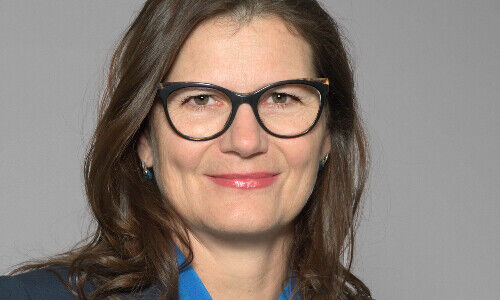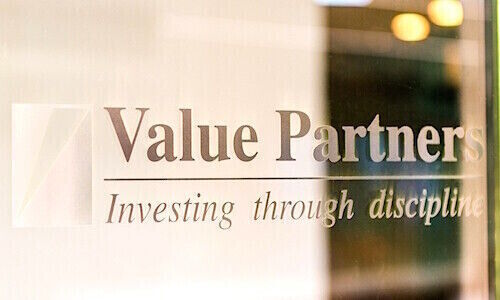Today’s world is riven by widening geopolitical divisions, with consequences for the global economy and financial markets. How should investors respond? In her article for finews.first, Nannette Hechler-Fayd’herbe examines six driving forces.
finews.first is a forum for authors to comment on economic and financial topics.
«Lose-lose dynamics» – that’s how the Munich Security Report 2024 describes today’s grave state of international relations. Many governments, it argues, no longer see the benefits of international cooperation.
In asserting their own interests, they may undermine many of its benefits. In this deeply fractured world, investors need clarity about what this means for the world economy and their investments. We see six major themes to guide portfolio allocations.
Growth does not cease in a fractured world. Historically, periods of more protectionist politics and policies have led to quite robust economic growth. Productivity may even rise in some years following independently achieved parallel innovations and technological breakthroughs. But in today’s world, the safety and reliance of supply chains have become much more important.
«In a fractured world, the sustainability of growth will depend much more on standalone strengths»
While this encourages «friend-shoring», competing powers try to prevent each other from acquiring an edge in strategic industries such as technology, defense and pharmaceuticals, leading to a decline in global cooperation, weaker multilateral trade, and lower potential growth over time.
Our 2024 growth rate forecasts for developed markets all stand at 1-2 percent. In a fractured world, the sustainability of growth will depend much more on standalone strengths, including sound fiscal fundamentals, labor market flexibility, and the capacity to adjust to shocks. Countries that cannot adjust risk becoming the «sick men» of a fractured world, because outside sources of stabilization are no longer readily available.
«We are experiencing more elevated inflation than in the golden times of globalization»
A fractured world does not necessarily mean higher inflation, but it does mean potentially more volatile inflation. Right now, we are experiencing more elevated inflation than in the golden times of globalization, when deflation was a key concern. But this is still the aftermath of the post-Covid supply shock, which temporarily raised goods and services inflation.
Today, goods inflation has normalized, and prices of services are following suit. But politics can rapidly change the picture. In a hypothetical second Trump administration for example, new trade tariffs, changes to immigration dynamics, higher fossil-derived energy production and corporate tax cuts could induce price change both ways, up and down, fueling inflation volatility.
«Central bank policy rates reached higher equilibrium levels than during the globalization era»
When inflation expectations become more uncertain, rate markets demand a risk premium. Not only have central bank policy rates reached higher equilibrium levels than during the globalization era, but bond yields for different maturities also include a risk premium and are stickier.
We expect US interest rates to reach 3.5 percent at the end of the rate-cutting cycle in 2025, and eurozone, UK and Swiss benchmark rates to reach 1.5 percent, 2.5 percent and 1.0 percent respectively. This contrasts with the previous decade of European central bank rates between -0.75 percent and 1 percent, and US rates below 2.5 percent.
«Asset allocation in a fractured world looks very different»
In the era of globalization, it was often lamented that there was no alternative to equities. Asset allocation in a fractured world looks very different. We forecast mid-single-digit returns for developed market equities on average in 2024. Current 4.3 percent yields-to-maturity in US Treasuries and 2.4 percent in German Bunds could generate similar or even higher 2024 expected returns as bond prices appreciate along with yield declines.
Fixed income as an asset class will therefore likely see a big comeback in investor portfolios, with alternative investments and cash also offering similar returns. Investors now have many alternatives to build a well-diversified portfolio – and crucially, they can assume lower volatility and risk for given expected returns.
«This overshadows the purely economic rationale»
In a fractured world, sanctions imposed by one block on another are a risk not only to supply chains but also to global financial assets. Outflows from the Chinese equity market were originally triggered by Chinese regulatory crackdowns in 2022. Still, they were sustained after that by tense US-China relations – risks that global investors simply do not want to take.
In a fractured world, countries trade and invest with their friends while avoiding their competitors. This overshadows the purely economic rationale. Faced with more risks in global investment opportunities, it may now be safer to increase the weight of domestic assets in portfolios.
«A world of geopolitical blocs may be a world of weaker multilateral trade»
As domestic asset allocations are increased in portfolios, exposures to additional diversifiers have to be considered. Gold in particular has its own drivers and correlates with few other assets, thereby providing useful diversification. For investors with an appropriate risk tolerance and longer time horizon, private or non-listed assets, as a separate source of risk premia and returns, are relevant as well.
A world of geopolitical blocs competing in strategic industries may be a world of weaker multilateral trade and lower growth over time. We see developed economies expanding by 1-2 percent in 2024. We expect more volatile inflation and slightly higher central bank policy rates than during the globalization era.
For investors, a higher risk premium means that quality fixed income and cash are now attractive alternatives to equities. Faced with the risks of a fragmented world, we have increased the weight of domestic financial assets in portfolios. For eligible investors, alternative investments and private assets are useful sources of portfolio diversification.
Nannette Hechler-Fayd’herbe is the Head of Investment Strategy, Sustainability and Research, CIO EMEA at Swiss Private Bank Lombard Odier.
Previous contributions: Rudi Bogni, Peter Kurer, Rolf Banz, Dieter Ruloff, Werner Vogt, Walter Wittmann, Alfred Mettler, Robert Holzach, Craig Murray, David Zollinger, Arthur Bolliger, Beat Kappeler, Chris Rowe, Stefan Gerlach, Marc Lussy, Nuno Fernandes, Richard Egger, Maurice Pedergnana, Marco Bargel, Steve Hanke, Urs Schoettli, Ursula Finsterwald, Stefan Kreuzkamp, Oliver Bussmann, Michael Benz, Albert Steck, Martin Dahinden, Thomas Fedier, Alfred Mettler, Brigitte Strebel, Mirjam Staub-Bisang, Nicolas Roth, Thorsten Polleit, Kim Iskyan, Stephen Dover, Denise Kenyon-Rouvinez, Christian Dreyer, Kinan Khadam-Al-Jame, Robert Hemmi, Anton Affentranger, Yves Mirabaud, Katharina Bart, Frédéric Papp, Hans-Martin Kraus, Gerard Guerdat, Mario Bassi, Stephen Thariyan, Dan Steinbock, Rino Borini, Bert Flossbach, Michael Hasenstab, Guido Schilling, Werner E. Rutsch, Dorte Bech Vizard, Katharina Bart, Maya Bhandari, Jean Tirole, Hans Jakob Roth, Marco Martinelli, Thomas Sutter, Tom King, Werner Peyer, Thomas Kupfer, Peter Kurer, Arturo Bris, Frederic Papp, James Syme, Dennis Larsen, Bernd Kramer, Armin Jans, Nicolas Roth, Hans Ulrich Jost, Patrick Hunger, Fabrizio Quirighetti, Claire Shaw, Peter Fanconi, Alex Wolf, Dan Steinbock, Patrick Scheurle, Sandro Occhilupo, Will Ballard, Nicholas Yeo, Claude-Alain Margelisch, Jean-François Hirschel, Jens Pongratz, Samuel Gerber, Philipp Weckherlin, Anne Richards, Antoni Trenchev, Benoit Barbereau, Pascal R. Bersier, Shaul Lifshitz, Klaus Breiner, Ana Botín, Martin Gilbert, Jesper Koll, Ingo Rauser, Carlo Capaul, Markus Winkler, Thomas Steinemann, Christina Boeck, Guillaume Compeyron, Miro Zivkovic, Alexander F. Wagner, Eric Heymann, Christoph Sax, Felix Brem, Jochen Moebert, Jacques-Aurélien Marcireau, Ursula Finsterwald, Michel Longhini, Stefan Blum, Zsolt Kohalmi, Nicolas Ramelet, Søren Bjønness, Gilles Prince, Salman Ahmed, Peter van der Welle, Ken Orchard, Christian Gast, Jeffrey Bohn, Juergen Braunstein, Jeff Voegeli, Fiona Frick, Stefan Schneider, Matthias Hunn, Andreas Vetsch, Fabiana Fedeli, Kim Fournais, Carole Millet, Swetha Ramachandran, Thomas Stucki, Neil Shearing, Tom Naratil, Oliver Berger, Robert Sharps, Tobias Mueller, Florian Wicki, Jean Keller, Niels Lan Doky, Johnny El Hachem, Judith Basad, Katharina Bart, Thorsten Polleit, Peter Schmid, Karam Hinduja, Zsolt Kohalmi, Raphaël Surber, Santosh Brivio, Mark Urquhart, Olivier Kessler, Bruno Capone, Peter Hody, Michael Bornhaeusser, Agnieszka Walorska, Thomas Mueller, Ebrahim Attarzadeh, Marcel Hostettler, Hui Zhang, Michael Bornhaeusser, Reto Jauch, Angela Agostini, Guy de Blonay, Tatjana Greil Castro, Jean-Baptiste Berthon, Marc Saint John Webb, Dietrich Goenemeyer, Mobeen Tahir, Didier Saint-Georges, Serge Tabachnik, Vega Ibanez, David Folkerts-Landau, Andreas Ita, Michael Welti, Fabrizio Pagani, Roman Balzan, Todd Saligman, Christian Kaelin, Stuart Dunbar, Carina Schaurte, Birte Orth-Freese, Gun Woo, Lamara von Albertini, Ramon Vogt, Andrea Hoffmann, Niccolò Garzelli, Darren Williams, Benjamin Böhner, Mike Judith, Jared Cook, Henk Grootveld, Roman Gaus, Nicolas Faller, Anna Stünzi, Thomas Höhne-Sparborth, Fabrizio Pagani, Guy de Blonay, Jan Boudewijns, Sean Hagerty, Alina Donets, Sébastien Galy, Roman von Ah, Fernando Fernández, Georg von Wyss, Stefan Bannwart, Andreas Britt, Frédéric Leroux, Nick Platjouw, Rolando Grandi, Philipp Kaupke, Gérard Piasko, Brad Slingerlend, Dieter Wermuth, Grégoire Bordier, Thomas Signer, Gianluca Gerosa, Christine Houston, Manuel Romera Robles, Fabian Käslin, Claudia Kraaz, Marco Huwiler, Lukas Zihlmann, Sherif Mamdouh, Harald Preissler, Taimur Hyat, Philipp Cottier, Andreas Herrmann, Camille Vial, Marcus Hüttinger, Serge Beck, Alannah Beer, Stéphane Monier, Ashley Simmons, Lars Jaeger, Shanna Strauss-Frank, Bertrand Binggeli, Marionna Wegenstein, George Muzinich, Jian Shi Cortesi, Razan Nasser, Nicolas Forest, Joerg Ruetschi, Reto Jauch, Bernardo Brunschwiler, Charles-Henry Monchau, Philip Adler, Ha Duong, Teodoro Cocca, Beat Wittmann, Jan Brzezek, Florin Baeriswyl, Nicolas Mousset, Beat Weiss, Pascal Mischler, Andrew Isbester, Konrad Hummler, Jan Beckers, Martin Velten, Katharine Neiss, Claude Baumann, Daniel Roarty, Kubilay Yalcin, Robert Almeida, Karin M. Klossek, Marc Taverner, Charlie T. Munger, Daniel Kobler, Patrick Stauber, Colin Vidal, Anna Rosenber, Judith Wallenstein, Adriano Lucatelli, Daniel Goleman, Val Olson, Brice Prunas, Francesco Magistra, Brigitte Kaps, Frances Weir, Luis Maldonado, Francesco Mandalà, Francesco Magistra, Nadège Lesueur-Pène, Massimo Pedrazzini, Eric Sarasin, David Ellis, Dina Ting, Ralph Ebert, Christopher Gannatti, Shaniel Ramjee, and Mihkel Vitsur.


























